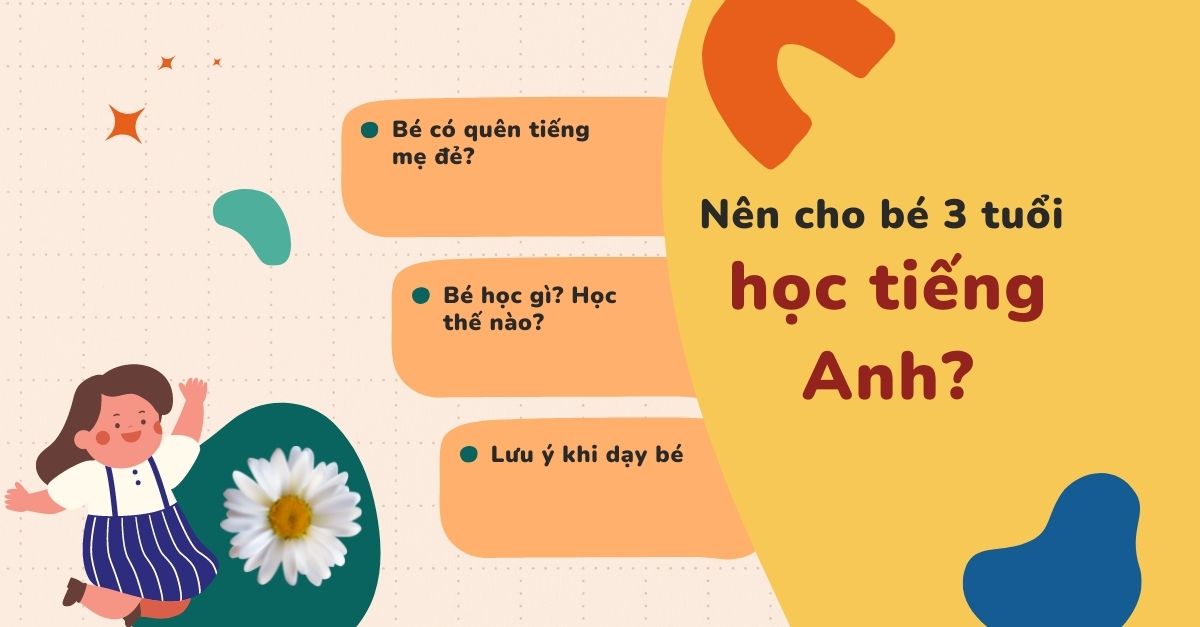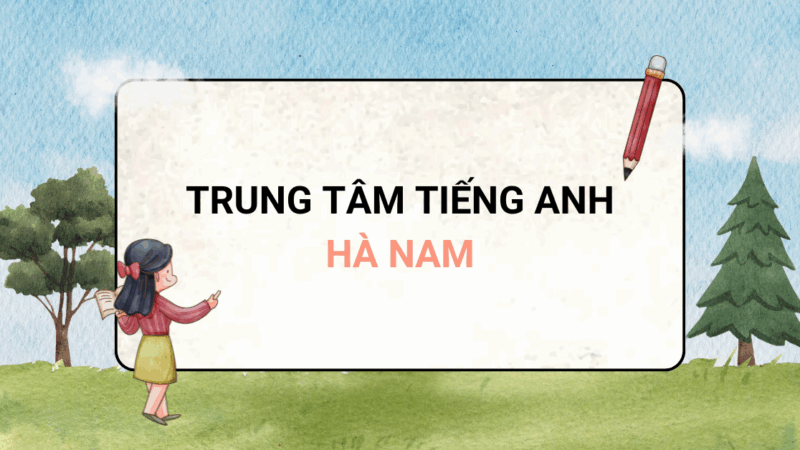Trả lời: Có nên cho bé 3 tuổi học tiếng Anh? Nên cho bé bắt đầu học từ đâu?

Should a 3-year-old child learn English when he or she is still at the age of learning to eat and speak? Are parents in a hurry to let their children learn to speak two languages? Will this cause the baby to have a language disorder? Many concerns and criticism surround the above issue. What is the truth and what is the right direction parents should choose? The article below from Nguyễn Tất Thành will give you useful answers.
- [Cập nhật] Mã code NRO BLUE, code Ngọc Rồng mới nhất 10/2024
- Phương pháp Active Recall là gì? Kỹ thuật ghi nhớ chủ động để tăng cường trí nhớ cho trẻ
- Tổng hợp FULL từ vựng tiếng Anh lớp 5 tập 2 [Mới nhất 2024]
- Giúp con làm bài tập tiếng việt lớp 4 chủ ngữ vị ngữ không còn khó nhờ 5 bí quyết này!
- Tập nói cho bé 1 tuổi – Phương pháp dạy bé nói nhanh, lưu loát
Should a 3-year-old child learn English so early?
Many parents wonder at what age should their children learn English? According to scientists, the best period to learn English is from 3 to 6 years old. Simply because:
Bạn đang xem: Trả lời: Có nên cho bé 3 tuổi học tiếng Anh? Nên cho bé bắt đầu học từ đâu?
-
This is a window period for language, children can quickly absorb 2000 words with regular practice.
-
Children are innocent, less shy, not afraid of mistakes, and ready to imitate. Compared to children aged 10 and up, the ability to pronounce and intonation in 3-year-old children is completely different.
-
In addition, at this stage, children do not have to study any subjects such as Math, Vietnamese, etc. Therefore, children’s minds are relaxed, without pressure, and have more time to spend on foreign languages.
With the above reasons, parents have answered that they should let their 3-year-old children learn English. Over time, you will see that this is the right decision for your child’s future. Children receive the following benefits:
-
Build a foundation of vocabulary, listening and speaking with confidence and solidity.
-
Children have increased ability to concentrate, become more active and active. This is shown by a study published by the prestigious American scientific magazine Nature. Specifically, children who know foreign languages early have higher gray matter density in their brains than children who do not.
-
Children have a rich understanding of the world because they encounter many topics during their studies. For example: Country, people, animals, objects,…
Does learning English make your child forget his mother tongue?
During the period from 2 to 5 years old, children are starting to practice speaking and forming language. Learning English early will make children lose focus and make it difficult to master their mother tongue.

For example, in the case of a baby combining two languages when saying “This is a cup”. Or your child has problems expressing themselves, their sentences are jumbled up and no one understands. Parents look at it and think that the child has a language disorder and developmental delay. Many people even stop children from saying that.
But according to many studies, this is a normal reaction. Children only reflexively use which vocabulary they are exposed to more. It is also a good sign that your baby is aware and receptive to language.
Therefore, parents should not try to eliminate or accidentally limit their children’s ability to develop bilingualism. From another perspective, the babies have Vietnamese and American parents. My child started communicating in two languages as soon as he learned to speak. When I grew up, I was very fluent and spoke like a native speaker.
Obviously, learning English does not affect the acquisition of the mother tongue. Parents, don’t worry too much, instead learn so your children can develop this tendency well.
Specifically, learn in the direction of “learning through play” through songs, flashcards, communication in daily activities, etc. Or let your children learn English through an App designed to suit each age.
Where should I start for a 3-year-old child to learn English?
The question of whether children should learn English from the age of 3 has been clarified. So for the bilingual process to be effective and for your child to develop his or her full potential, where do you need to start teaching English to a 3-year-old child? The following is a useful handbook of methods for parents to refer to and apply to their children:
Start learning from English children’s songs
Why encourage 3-year-old children to learn English through songs? Easy to understand because this is not simply about listening and enjoying music. On the other hand, according to the baby’s natural reflex, he recites and sings along until he knows it by heart.

Gradually, my child’s intonation in English becomes good, like a native speaker. Furthermore, songs for preschool children are often short and repetitive. Therefore, children can easily absorb vocabulary and grammar.
Sometimes, children are good at even simple sentences, applied to real communication. There are too many benefits received through this method that parents cannot ignore. Let’s apply it as follows:
-
Xem thêm : Truyện cô bé quàng khăn đỏ tiếng Anh: Tóm tắt truyện, dịch nghĩa
Choose video songs suitable for the age of preschool children.
-
The song has clear, simple lyrics and eye-catching illustrations to make it interesting for children to imitate.
-
Let your children learn English using topics that are close to their interests. For example: Colors, animals, numbers, family,…
-
Sing and dance with children to inspire excitement.
However, initially, parents also need to pay attention to a few things to avoid counterproductive effects. Such as:
-
Children’s attention span is short, from 5 to 10 minutes. So in one session, only let your baby listen to 1-2 songs and repeat the next day.
-
Don’t expect your child to sing along or memorize. Let your child learn and play according to their natural ability and ability to remember.
-
Reduce use of native language while learning English.
Let your child learn vocabulary by topic
As mentioned, at preschool age, children’s brains learn very quickly, so parents should let their children learn vocabulary. This will not be too stressful or put children in an early learning framework. Children approach English in a learning-while-playing style as follows:

-
Learn through English books with eye-catching images and a moderate amount of vocabulary. You can refer to the book series: Peek-a-Boo, 101 First words, What’s your name?, Hooked on Phonics,…
-
Children love to have fun, so incorporating games into their learning is a good idea. Flashcard – a typical tool for learning vocabulary. With eye-catching images and large fonts, children can easily remember vocabulary.
-
Download vocabulary sets online by topic, with illustrations. For example: Topics about fruits, household items, toys, bodies, animals,…
-
Use Nguyễn Tất Thành Junior – Famous English vocabulary learning app in 108 countries. The program includes 56 topics from basic to advanced. 3-year-old children practice standard English – American pronunciation and use words and phrases fluently.
Practice, practice and practice speaking English every day for your baby
Practicing speaking English for children is essential. Simply because young children learning any language need to interact with people around them.

Children can hear sounds and intonations to practice continuously. This way you can master the language instead of passively keeping that vocabulary in your head.
In addition, parents can skillfully integrate English into daily activities. For example, encourage children to say hello, goodbye, and introduce themselves. Or practice words and sentences that children have just heard on songs, flashcards,…
Regardless of the practice, parents should keep in mind that this is interactive. It does not mean testing, the child is obliged to memorize and know immediately.
Xem thêm : Tiếng Anh cho trẻ em chủ đề hoa quả: Từ vựng + Ngữ pháp quan trọng
During the process, if your child makes a mistake, parents should gently remind them, do not interrupt or order them to repeat. Instead, focus on practicing pronunciation rather than forcing children to remember vocabulary. If you answer correctly, give your child encouraging praise.
Furthermore, at such a young age, catching grammatical errors is a mistake that should be avoided. This unintentionally puts children in the habit of thinking about sentences correctly before speaking.
Most importantly, parents should not make their children have low self-esteem and dislike foreign languages when comparing them with their friends. You are the one who understands your child’s abilities best, so please be patient with him.
See more: 5+ Secrets for teaching English to 1-year-old babies that wise parents should know
Learning English for 3-year-old children starts with an online learning program
Always creating an environment for direct interaction with your child is something every parent is ready for. However, in case you do not have time or are not proficient in foreign languages. So should a 3-year-old child learn English with an online program?
In fact, this method is now accepted by many parents. The reason is because it is flexible, parents save time on transportation, and children actively learn anytime, anywhere.
On the other hand, Online programs are invested in developing both image and teaching content. All designs are age appropriate according to international standards. Especially with a clear roadmap, parents can monitor their child’s progress and learning results.
Notes when letting 3-year-old children learn English
In the process of letting 3-year-old children learn English, parents also need to pay attention to a number of issues. The purpose is to avoid turning learning into an obsession or heavy pressure for children.
Learn correct pronunciation right from the beginning
What your baby receives when starting to get acquainted with language will easily be ingrained in his memory. Even, everything will become basic knowledge. Therefore, parents should pay attention to teaching children correct pronunciation right from the beginning.

If you are not good at this foreign language, take your child to study at a center or hire a tutor. In addition, to save costs and still ensure children’s pronunciation is effective, parents can let their children learn through App Nguyễn Tất Thành.
With Nguyễn Tất Thành Phonics, children access lessons with 100% native voices. Throughout the process, children are trained to pronounce correctly, without missing final sounds.
Learn in a method suitable for each child
More than anyone, parents are the ones who understand their children’s abilities best. Therefore, be very careful to apply learning methods that are suitable for your children, avoiding herd mentality.

For example, if you see other children learning this way effectively, force your child to follow it. As a result, children learn slowly or cannot progress like many people.
Therefore, depending on each child’s ability, parents choose the most natural form of learning. It can be through simple songs or animated movies, short stories, Ebooks, etc. Children are exposed to foreign languages first without needing to understand the meaning.
In the early stages, children cannot fully express their thoughts, parents can continue to expand on what their children want to say. For example: You see fried chicken and say chicken, you repeat “You want to eat chicken, right?”
After being exposed to many topics, parents should apply them to their children’s daily lives. Specifically: Give me an egg, please – Get me an egg. Appropriate learning methods will help children absorb English naturally.
Avoid confusion between English and Vietnamese languages
Through the content of the answer to whether you should let your 3-year-old child learn English, you also know that your child may have a language disorder. This situation occurs when the teaching method is not correct.

Specifically, parents do not separate the two languages when teaching them to their children. Some parents even use half-Vietnamese and half-English applications when communicating with their children.
To completely avoid the above situation, parents should be clear from the beginning and not integrate bilingualism when teaching. During class, please use it completely and instruct your child to respond in 100% English. Outside of the above time, you can freely use Vietnamese with your children.
Do not put pressure on your baby
The majority mentality of most parents is to be impatient for their children to excel quickly and achieve good results. Therefore, sometimes they do not calmly teach or force the child to accept a large amount of lessons.
That is the pressure that makes children lose interest at the age of 3, and learn because they are afraid of their parents. Even the ability to absorb is slowed down due to dislike of English.
On the other hand, children tend to absorb knowledge better when they feel interested. For this process to be most effective, create a natural English environment for children. This means that parents need to accompany and patiently teach their children.
Conclusion
After the above article, parents surely have the answer to whether or not they should let their 3-year-old children learn English. Hopefully, with Nguyễn Tất Thành, you will help your child choose the right direction. In the future, my child will comprehensively develop both foreign languages.
Nguồn: https://truongnguyentatthanh.edu.vn
Danh mục: Giáo dục





